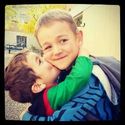-
About
- About Listly
- Community & Support
- Howto
- Chrome Extension
- Bookmarklet
- WordPress Plugin
- Listly Premium
- Privacy
- Terms
- DMCA Copyright
- © 2010-2025 Boomy Labs
 Esther Lombardi
Esther Lombardi
Listly by Esther Lombardi
The City, by Dean Koontz, is a seething tale of terrorism and all the realities of our modern age. We are drawn into the story of Jonah, who grows up amid the chaos and devastation of a society (and family) in various states of chaos. Despite all the loss, Koontz leaves us with a sense of abiding hope--faith in the possibility that words, music and even art will offer meaning... a way to survive no matter what may come.
I will never forget the day that I sat in on the lecture by the authors of Farewell to Manzanar. There's nothing quite like learning more about the ways in which real-life history intersects fiction. It adds a razor's edge focal point, a new way to re-envision long-held beliefs and perspectives. If there really is such a thing as the "American dream," how does the nightmare of a "desert ghetto" fit into that overarching theme in American literature? Is there a disconnect? If we look at the dream, and compare it the realities, are the two mutually exclusive?
Farewell to Manzanar offers an intriguing perspective on the Japanese-American experience during World War II, but you man also discover intriguing insights into the lives and experiences of the Japanese Americans in The City, by Dean Koonz
If you've ever read A Prayer for Owen Meany, it's likely to stay with you for a long time, if not forever. There's something about the events in Owen's life that draw toward an inevitable conclusion. In The City, Jonah wonders (and asks Miss Pearl) what he's supposed to do. His life has been placed upon a path; each day brings him closer to the inevitable. In A Prayer for Owen Meany, he knows that he's "God's instrument." Still, we're drawn to the similar elements, which incorporate the overpowering forces of faith, friendship and fate.
I love To Kill a Mockingbird, by Harper Lee; so it's probably not so shocking that you'd find this book on a list of "must-read" novels!
It's also a testament to the greatness of Atticus and all his clan--that we're still referring back to Lee's controversial classic, even when we're trying to make sense of the most contemporary of novels. All that it takes for evil to succeed is for good people to do nothing. And, "courage" doesn't mean you're not afraid... just that you push through your fear. You do what's right anyway.
It's the fourth book that Mildred Taylor wrote about the Logan family, but this one was the first one I read about Cassie and her family. This novel was set in the Great Depression, which as all books--fiction and nonfiction--tell us was a devastating time in our history. But, we're also allowed to see courage and strength... that brilliant tenacity that will endear the characters with us for a long time (perhaps forever).
And, when I read The City, by Dean Koontz, I was forced to recall this quote: “Baby, we have no choice of what color we’re born or who our parents are or whether we’re rich or poor. What we do have is some choice over what we make of our lives once we’re here."
Yes, the story of Anne Frank is well-known, but it's still possible (even likely) that you've never actually read all of the autobiographical words that we have from her. This is her letter to the world, although she'd seen so little of it. Her words depict the horrors of war, the realities of humanity, but also some sense of forgiveness, hope and a belief in the goodness of others.
Anything can happen. That's certain, whether we're reading Anne Frank's story or this novel by Dean Koontz. In The City, our main characters encounter evil, pain, loss and death. Yet, Jonah rises above all that.
